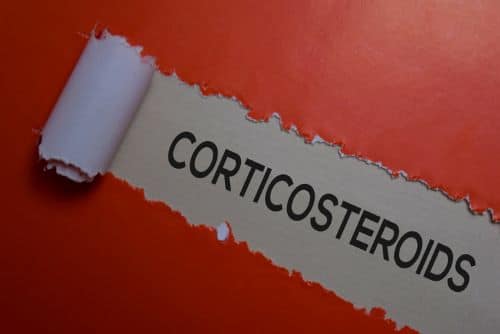When cortisone was introduced in the 1940s, it seemed like a miracle drug.
People who were bedridden with arthritis or needed wheelchairs could suddenly walk or even climb stairs for the first time in years.
The anti-inflammatory effects were so dramatic that the three researchers who formulated cortisone shared a Nobel Prize in 1950 for the discovery.[1]
Soon, scientists came up with other similar corticosteroid drugs such as prednisone, dexamethasone, and prednisolone. Doctors prescribed them not only for arthritis, but for virtually any inflammatory condition including allergies, asthma, bronchitis, colitis, Crohn’s disease, eczema, lupus, joint injuries, back pain, and many more.[2]
As more people began taking the drugs, it soon became clear that the inflammation-fighting effects of corticosteroids came with a heavy price. Patients taking them for long periods came down with heart disease, diabetes, cataracts, ulcers, osteoporosis, and all kinds of infections.
These days, doctors try to avoid these problems by prescribing corticosteroids in “short bursts.” A quick course of the drugs is supposed to speedily tamp down inflammation without the risks of long-term usage.
But a major new study shows that even a few days on the medications is more dangerous than doctors believe.[3]
The research was published in the journal Annals of Internal Medicine. Investigators analyzed the health data of 2.6 million people. All had at least one course of corticosteroids.
These patients had double the risk of blood poisoning (sepsis), gastrointestinal bleeding, and heart failure of people who hadn’t taken the drugs.
The highest risk occurred in the first month after taking the drug.
Steroid drugs can be lifesaving for certain serious conditions such as lupus, severe asthma, and extreme allergic reactions. But the researchers found that corticosteroids were most often prescribed for relatively minor conditions such as rashes and coughs.
“Physicians who consider prescribing steroid bursts should weigh the benefits against the risks,” the study authors wrote.[4]
The findings confirm previous research. A 2017 study published in the British Medical Journal found short-term oral corticosteroids double the risk of bone fractures, triple the risk of deep vein thrombosis, and quintuple the risk of sepsis.[5]
If your doctor wants you to take a prednisone, cortisone, or another corticosteroid drug for a non-life-threatening condition, ask about other options.
5 Natural Inflammation Remedies
Here are the best natural approaches to fighting inflammation:
- Avoid inflammatory foods. They include soda and other sweetened drinks, refined carbohydrates such as white bread and sugary foods, foods with trans fats such as margarine and French fries.
- Eat anti-inflammatory foods. They include olive oil (go HERE to find out how to make sure you get the real thing), fatty fish (salmon, sardines, mackerel, anchovies), cruciferous vegetables (broccoli, cauliflower, kale), fruit (blueberries, strawberries, cherries, and oranges), avocados, bell peppers, and chili peppers.
- Stay trim. Being overweight promotes inflammation. A great way to lose weight is with time-restricted eating (TRE).
For a study published in the journal Cell Metabolism, scientists had overweight people do all their daily eating in a span of 10 hours.
It didn’t matter when they started eating, as long as they had their last food of the day about 10 hours later. They could eat whatever they wanted and as much as they wanted.[6]
After 12 weeks, the study participants had lost 3% of their body weight on average. They lost 3% of their belly fat and reported getting better sleep. That means a 200-pound person would have lost six founds without exercising more or denying themselves foods they like.
To do TRE, start by eating breakfast 15 minutes later than usual. And have dinner 15 minutes earlier. Each week, shorten your eating window by a half hour by eating breakfast 15 minutes later and dinner 15 minutes earlier.
Stop reducing your eating window when it is at 10 hours. So if you eat breakfast at 8 a.m., you should finish dinner by 6 p.m. - Be active. Inflammation increases in most people as they get older. But research shows that older men who are aerobic exercisers (walking, jogging, swimming, biking) have levels of inflammation almost as low as 25-year-old men.[7]
- Take curcumin and fish oil. Both are safe, proven inflammation fighters.
Curcumin is a natural compound that comes from the spice turmeric. By itself, curcumin is poorly absorbed. So look for supplements that pair curcumin with piperine, a black pepper extract. It improves curcumin’s bioavailability.
Look for omega-3 fish oil brands that contain the triglyceride form of fish oil. This should be noted on the label. A high-quality fish oil will also be relatively free of any fishy tastes or smells. The oil should be nearly translucent and not cloudy.[8]
We know now that corticosteroids are far more dangerous than doctors have led us to believe. They should be taken only a last resort.
Editor’s Note: Discover other natural, nondrug methods to improve your health by reading our monthly journal, Independent Healing. It’s your best source for unbiased, evidence-based health information. To find out how to subscribe, go HERE.
Related Articles
5 Best Ways to Lower Inflammation
Fight Inflammation With the Tree of Immortality
Exotic Seafood Slashes Inflammation 63%
Like this Article? Forward this article here or Share on Facebook.
[1]https://jamanetwork.com/journals/jamainternalmedicine/article-abstract/554704
[2]https://www.healthline.com/health/corticosteroids-what-are-they
[3]https://pubmed.ncbi.nlm.nih.gov/32628532
[4]https://www.peoplespharmacy.com/articles/do-doctors-know-short-term-steroids-are-not-always-safe?utm_source=The+People%27s+Pharmacy+Newsletter&utm_campaign=92e7b5a285-MC_D_2020-08-25%26subscriber%3D1&utm_medium=email&utm_term=0_7300006d3c-92e7b5a285-221156881&goal=0_7300006d3c-92e7b5a285-221156881&mc_cid=92e7b5a285&mc_eid=d45e3bef7f
[5]https://www.bmj.com/content/357/bmj.j1415
[6]https://www.sciencedirect.com/science/article/pii/S1550413119306114?via%3Dihub
[7]https://journals.physiology.org/doi/abs/10.1152/japplphysiol.00495.2019
[8]https://www.healthline.com/nutrition/fish-oil-dosage

